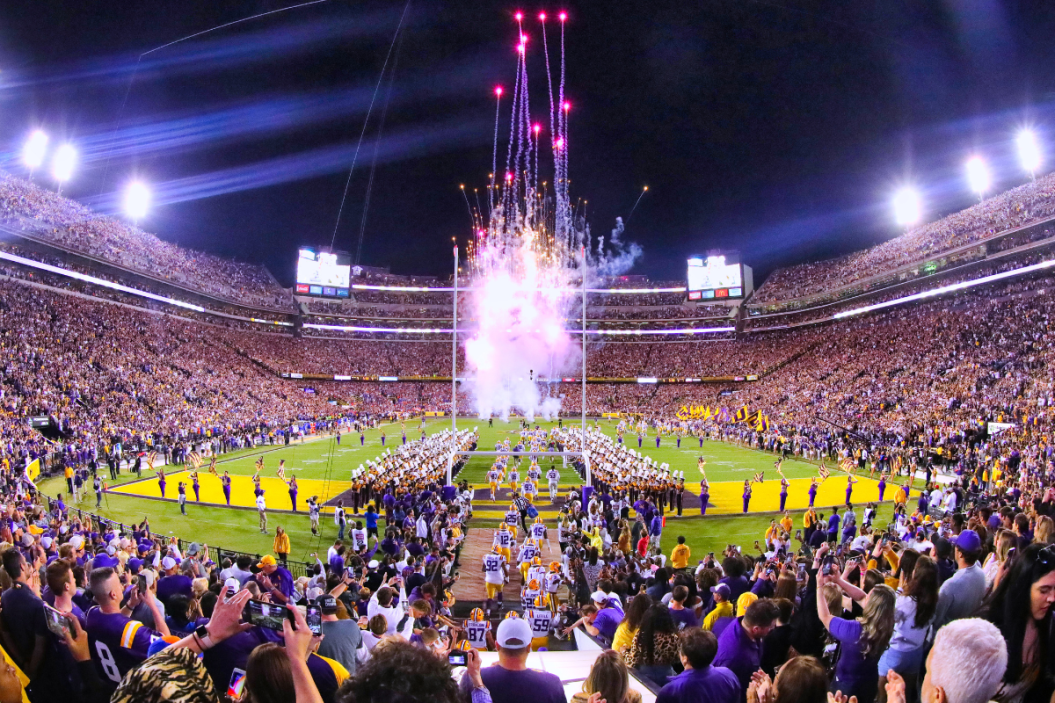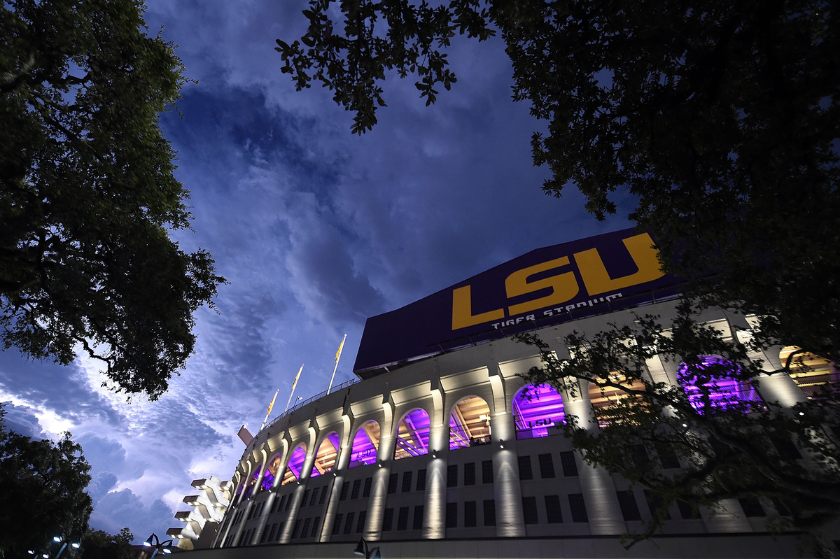Louisiana State University is known for many things in college football. Nothing is more imposing than Saturday night games inside Tiger Stadium, however.
The unforgettable "Earthquake Game" in 1988 helped cement that. When Tommy Hodson hit Eddie Fuller to give LSU a 7-6 win over the Auburn Tigers, you could feel the reverberations in New Orleans. Or so we'd like to believe.
The Tigers have been hosting regular-season games in the evening since 1931, first beginning due to scheduling conflicts between other schools and the LSU fans around Baton Rouge.
The Tigers play the most night games in the SEC and dominate while playing after the sun goes down. According to the 2020 LSU football media guide, the Tigers played 459-night games at home and are 338-108-13 (.751) in those contests. Compare that with their 93-43-5 (.677) mark during the day, and you see why the Tigers play so many night games.
But how did this all get started? What is the reasoning behind one of the best traditions in NCAA sports?
The Tigers Hunt at Night: LSU's History After Sunset
RELATED: "Callin' Baton Rouge": LSU's Electric Pregame Anthem is Must-See TV
In 1931, the Tigers had scheduling conflicts with Tulane, one of the country's best programs out of New Orleans and a regular rival. To try and find a way to work out a game between the best programs in the state of Louisiana, Thomas Pickney "Skipper" Heard came up with the idea, as the graduate manager of athletics and a former LSU student.
The idea not only paved the way for the Tulane Green Wave football game but an opportunity for more fans to attend home games. The first time the school hosted a team with their lights came on October 3, 1931, when the Spring Hill Badgers visited Baton Rouge. LSU beat the Badgers down, 35-0.
The hope was that a night game would attract the people of Louisiana who would be finished with their work on their plantations and refineries. Many couldn't attend afternoon games, but they could easily make it to evening games. With workers getting off at 7 p.m., an 8 p.m. kickoff provided a way for blue collar workers in Baton Rouge to kick back and relax while taking in some college football.
Competition for fans was also a factor in Heard's decision. Tulane, which was in it's golden days, played in the afternnon. A later kickoff would help LSU compete. The heat also played into the shift to a sundown start, as the concrete seats at Tiger Stadium could fry an egg in the Louisiana heat on any given September Sunday. A late gametime meant cooler temps, which improved the spectator experience and as we can see from the record above, it didn't hurt their on-field performance either.
The first night game did not precisely draw tons of fans, though, only being played in front of 7,500 people. But that would change once word got out.
How the SEC Saved Night Games in College Football
And though we were a long way off from hearing "It's Saturday Night in Death Valley," it would only take a few more years for the tradition to take hold. Heard led the way on extensive stadium renovations that significantly increased the capacity of the stadium. In 1932, the Southeastern Conference's formation gave LSU like-minded opponents who were close in proximity.
Instead of playing in the Southern Conference, which was made up of teams from as far away as Maryland and Virginia, LSU would be part of a conference with many of the current SEC teams. The group included Alabama, the Florida Gators, Tennessee Volunteers, Mississippi State Bulldogs, South Carolina Gamecocks and Ole Miss Rebels. The conference began with 13 teams.
This was important because each school was much closer geographically and saw football as their most important sport. And while that may not be the case in today's current NCAA climate with UCLA and USC opting to join the Big Ten, the Southeastern Conference was a big step in creating strong frameworks for collegiate competition. Seriously, who wants to watch a 9 a.m. West Coast game between Rutgers and USC on a Saturday morning? But, I digress.
But the most important thing was that the Tigers began to build an outstanding program. In 1935, Bernie Moore took over as head coach and led LSU to two SEC Championships and three Sugar Bowl appearances in his first three seasons.
Even though it wasn't a successful tradition initially, it didn't take long to become one of the most famous places to play college football when the sun goes down.
During the Les Miles era, the LSU Tigers held home game kickoff at night regularly. If the television schedules made by networks like CBS and ESPN had been letting Miles decide, each home game probably would have been played at 7 p.m. at the earliest.
Head coach Ed Orgeron, who led the team to a national championship with the help of Joe Burrow and Joe Brady, continued that tradition. And this upcoming season we'll see Brian Kelly, one of the most well-paid coaches in college football to the same, so expect plenty of games under the lights in the future.
The possibilities make us bristle with excitement. The Arkansas Razorbacks and Missouri Tigers seem like they are on the rise. Jimbo Fisher's Texas A&M Aggies and the Georgia Bulldogs are always a strong choice for a primetime night game in SEC Country. Then, of course, there's any visit from former LSU coach Nick Saban and his Alabama Crimson Tide.
Although, if we're honest, there's one thing we want to see. A home-and-home series with the Clemson Tigers to see which team's stadium truly earns the nickname "Death Valley."
LSU fans already know that answer.
Saturday Night in Death Valley may not have succeeded initially, but LSU fans everywhere know that it's a rousing success today. One that plays to LSU's advantage as well as to the advantage of college football fans everywhere.
This post was originally published on July 25, 2019, but football season is upon us, which means Saturday nights in Death Valley are returning.

